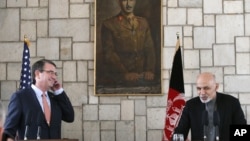The new U.S. defense secretary, Ashton Carter, met in Kabul Saturday with Afghanistan’s President Ashraf Ghani, who sounded optimistic about his government's efforts to promote peace and reconciliation with the Taliban. Carter revealed that Washington is reconsidering its troop-withdrawal plans in light of Mr. Ghani's comments.
Pentagon chief Ashton Carter chose Afghanistan for his first official trip abroad as U.S. defense secretary amid media accounts of initial contacts between the Afghan Taliban organization and the United States. This, even though all parties concerned have disavowed those reports.
Carter stood beside Afghanistan's president, Ashraf Ghani, who spoke about the prospects for peace between his government and the Taliban without ever confirming the two sides have been in contact, or whether the insurgents have signaled their willingness to come to the table.
“The grounds for peace have never been better in the last 36 years. Our approach is productive," he said. "We are hopeful, but categorical answers in a peace process are dangerous. ... The questions are under consideration, the direction is positive [but] we cannot make premature announcements.”
Carter suggested that this more hopeful outlook for Afghan democracy is one of the reasons the Obama administration is considering whether to slow down troop-withdrawal plans and review its counter-terrorism mission in Afghanistan. He said the issue will be discussed when President Ghani visits Washington next month.
“We are discussing and rethinking the details of the counterterrorism mission, and how the environment has changed here with respect to terrorism since we first laid out our plans," he said. "And that is an important consideration for our president as he thinks about the next few years [and] discusses them with President Ghani, and they reach their views about what we are going to do. So rethinking the counterterrorism mission is part of the discussions that the two presidents will be having next month.”
Carter said the peace process in Afghanistan is a priority issue for the United States. Recalling his first meeting with President Barack Obama at the Oval Office in Washington a few days ago, the defense chief said Mr. Obama made clear that he wants democratic progress and peace in Afghanistan to "stick" - to endure.
Currently there are around 10,000 American soldiers in Afghanistan. President Obama's goal is to reduce that number by half by the end of this year, and to continue withdrawals until there is only a normal U.S. embassy presence in Afghanistan by 2016.
As he flew to Kabul - a trip that was kept secret until he arrived Saturday - Carter said he had seen varying reports about Afghanistan, including some that indicated a resurgence of Taliban strength, and others suggesting that a small group of militants had already "rebranded" themselves as members of the Islamic State group. For those and other reasons, the Pentagon chief said, he needed to make a first-hand assessment of the situation and meet directly with both U.S. military officers and Afghan officials.
The U.S. visitor's indication of a possible change in military strategy follows criticism from some Republicans in the U.S. Congress who contend that a too-rapid withdrawal of American troops could result in turmoil that would turn Afghanistan into another Iraq, torn by a strengthened insurgency.
President Ghani previously has suggested slowing down the U.S. withdrawal timetable. Speaking to reporters Saturday, the Afghan leader thanked President Obama for taking a flexible approach to this issue and showing his willingness to consider “the realities on the ground.”
Afghan security forces lost more than 5,000 soldiers during 2014 in their fight against the Taliban and other insurgent groups, and there are fears that continuing instability could allow the Islamic State terrorist group to establish a foothold in the region.




